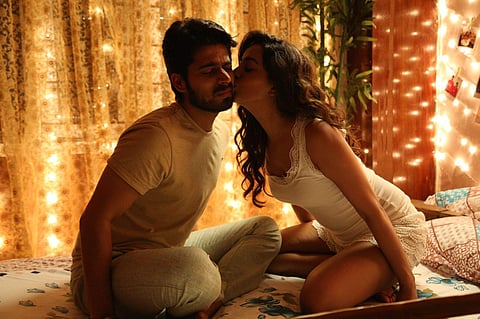

A man who smokes, drinks, is going through ‘love failure’, has a significant other, wears jeans, shorts, T-shirts, watches movies, uses mobile phone, has friends… is a regular Tamil cinema hero, or his best friend, classmate etc. Whereas a woman who does any or all of this is a radical. Herein lies the basic problem with the ‘modern’ woman and her portrayal in our cinema. I recently watched Taramani (which is streaming on Netflix) when this thought struck me. Our films are still trying to cajole the audience into ever-so-lightly being okay with this ‘modern’ woman. This whole idea of who’s modern and who isn’t based on the language the woman speaks (in our cinema, it is predominantly English with a smattering of the local language), what she’s comfortable wearing (western clothes, obviously) and her worldview (unsentimental, duh) is to begin with so problematic. How is this any different from Padaiyappa trying to figure out if a woman is sathveegam or bhayanakam?
In real life, as we all know, there are many women who wear pants and aren’t okay with the idea of just living in with the man they love. And many women who, driven by circumstances and conviction, have decided to say no to marriage and stay alone or live in with a partner. These women waltz around comfortably in sarees. It’s almost as if, gasp, women are human, and not mere categories men can either worship, ogle at or be scared of. As mortals, we are all confronting our mortality, life and the many paths in front of us, trying to figuring which one to take and how to stay out of trouble. Men, women, genderqueer. All of us. But the male gaze refuses to engage with us. Those of us who are not male. And this gaze has taken control of this medium of cinema and refuses to listen when the rest of us say we aren’t seeing ourselves. Why should we care about how cinema portrays us? We needn’t. But in a state like TN that has produced four chief ministers who are connected to cinema, and has produced over a dozen politicians (male and female), it might be instructive to see and learn from cinema and its impact on real life.
Our filmmakers’ reluctance to directly show class and caste conflict means, they make do with superficial conflicts like this between the hero and the heroine. Taramani tries to highlight some of these notions. The hero, Prabhu (Vasanth Ravi) is overcome by jealousy, possessiveness and the need to ‘control’ Althea (Andreah Jeremiah) as soon as the two are in a relationship. Althea is a stranger to us for most of the film. We see her, we know her story, we know she wears ‘modern’ clothes, smokes and drinks. She also extracts a public revenge from a boss who behaves inappropriately and is steadfastly committed to the hero and, for the most part, her son (even if in one scene she gets drunk dramatically and passes out, when there is no one else to take care of the boy). But we never ‘know’ her, the way we know Prabhu. He has an arc, he sins, he doubts, he regrets, he reforms. While she stays in the backdrop like a saint. Prabhu’s ex Anjali is a seemingly traditional girl at first (the voiceover even makes a grand mention of what a rarity she is because she wears a dupatta), but she dumps him, then cheats on her husband with Prabhu later and says he’s a nice guy. (For the record, he isn’t. Even he knows that. But for some reason all the women in this film are convinced he is.) So the idea of who’s a good girl and who is bad is challenged in Taramani. Whereas the hero of this film gets to be both good and bad. He has the magical ability to have shades of both.Whereas the film makes mere concessions for its women mistaking characteristics for character arcs. How can 'she smokes and drinks, but doesn’t cheat' be a character arc? Or, for that matter, 'she goes from wearing dupatta to mini skirt, but cheats'?
What Taramani fails to do, in terms of its portrayal of actual class conflict, Pyaar Prema Kaadhal does very successfully. It establishes the conflicts in a more real manner. This isn’t to dismiss Taramani entirely. The film engages and is surprisingly upbeat (the music and the voiceover definitely perk it up), and Ram’s sense of humour and his commentary on the state of affairs of this country – from demonetisation to the fishermen’s issue - add great depth and lift the film up to a much higher plane. It’s just that PPK did the conflict between the man and the woman much better.